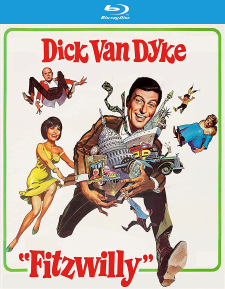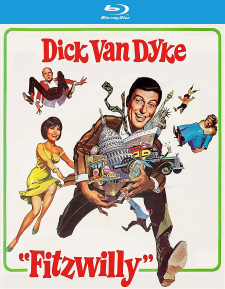Fitzwilly (Blu-ray Review)

Director
Delbert MannRelease Date(s)
1967 (August 17, 2021)Studio(s)
The Mirisch Corporation/United Artists/MGM (Kino Lorber Studio Classics)- Film/Program Grade: B-
- Video Grade: A-
- Audio Grade: B+
- Extras Grade: A
Review
Fitzwilly stars Dick Van Dyke, with a fine supporting cast, in a caper story based on improbabilities and motivated by sentiment. The plot relies on the cleverness, depth of loyalty, and the willingness of otherwise good people to collude in breaking the law for the sake of keeping up appearances.
Claude R. Fitzwilliam (Van Dyke) is butler to Miss Victoria Woodworth (Dame Edith Evans), a kindly, elderly philanthropist whose deceased millionaire father has left her penniless. Her loyal staff has resorted to shoplifting and hijacking ever since to keep her in the style to which she’s become accustomed. Fitzwilliam, known to his friends as Fitzwilly, rationalizes that they’re doing nothing wrong because insurance will cover the losses and the old lady donates a lot of money to charities.
Fitzwilly, descended from a long line of butlers, leads the rest of the staff in carrying out this Robin Hood-inspired theft by coming up with ingenious schemes to relieve high-end department stores like Lord & Taylor, Abercrombie & Fitch, Georg Jensen, and B. Altman’s of costly items while avoiding all suspicion.
This arrangement works with clockwork precision until Miss Victoria hires a Columbia University graduate student, Juliet Nowell (Barbara Feldon of TV’s Get Smart), as her secretary to assist her with writing a dictionary for bad spellers. The staff is concerned that an outsider among them will breach security and hamper their upcoming scheme. They must exercise particular caution to keep Juliet in the dark.
Juliet observes doleful footman Albert (John McGiver), formerly a minister, pickpocketing a visitor and confronts him. Guilt-ridden, he promises to refrain from such activities in the future and Juliet mercifully assures him that she will not report his misdeed.
After a rocky start, the relationship between Juliet and Fitzwilly develops into a romance and she agrees to keep silent about the illegal strategies that are essential to keeping up appearances, all for the benefit of a good-hearted elderly woman.
Director Delbert Mann had fashioned the story into a stylish comedy with a first-rate supporting cast of character actors that includes Cecil Kellaway, Norman Fell, Sam Waterston, John Fiedler, and Harry Townes. Like most caper films, part of the fun is seeing just how the perpetrators pull off their robberies. Relying on precision, timing, and trust, these are not strong-arm bandits and never resort to physical violence. Their methods and their motives make them sympathetic.
Dick Van Dyke infuses elements of his affable Rob Petrie character from his TV show, but with a touch of larceny. His Fitzwilly is the perfect butler—well turned out, impeccably polite, totally loyal to his employer, and protective of her well being. His romantic scenes are touching. He’s found a person other than Miss Victoria to devote himself to, and we see him vulnerable to the charms of a lovely young woman.
Juliet, the outsider, is supposedly a bright grad student, yet she seems oblivious to the machinations going on all around her until it’s convenient for the script to clue her in. Barbara Feldon makes her scene with McGiver touching and believable for her character.
Dame Edith Evans doesn’t have a great deal of screen time but steals every scene she’s in. An actress who has done Shakespeare and appeared in classic plays, she looks as if she’s having a ball with this lighter material, and there’s a twinkle in her eye that is irresistible. Isobel Lennart’s screenplay paints Miss Victoria as the opposite of the self-centered wealthy dowagers typically portrayed in movies. She thinks first of giving to others. Ignorant of her staff’s subterfuge, and believing she’s still rich, she is innocent of complicity.
The film’s elaborately staged Big Scene is the climactic plot to steal Gimbel’s pre-Christmas receipts. Filled with plenty of slapstick and broad comedy, the sequence shows how a concerted effort by determined perpetrators with a well-thought-out plan can create chaos in one of New York City’s biggest department stores during one of the biggest shopping days of the year.
Featuring 1080p resolution, the Blu-ray release of Fitzwilly from Kino Lorber Studio Classics is presented in the widescreen aspect ratio of 2:35:1. Picture quality is sharp, with details nicely delineated. Complexions have a soft creamy tone, and the production design of Miss Victoria’s mansion nicely suggests wealth with its antiques, elaborate furniture, and large staff. The color palette is saturated with reds that really pop in bows on Christmas wreaths, the staircase carpet, and the butler’s vests. Miss Victoria’s hats, purloined silverware, and the blue and orange uniforms of the boys in the scout troupe she leads also stand out. Joseph Biroc’s cinematography, bright and evenly lit with few shadows, provides a light-hearted atmosphere. Most of the scenes are interiors, the most elaborate being the robbery of Gimbel’s, which features what looks like hundreds of extras, stunts, and staged comic bits. Credits appear at the beginning of the film, as was common in the mid-1960s, and are in bold yellow letters.
The soundtrack is English 2.0 Mono DTS-High Definition Master Audio. Optional English SDH subtitles are available. Dialogue is clear and precise throughout. It’s a pleasure to hear everyone speak in full sentences, using vocabulary suitable to their station. Van Dyke uses different accents as he poses as various individuals in his schemes. Fitzwilly is initially aloof in his manner with Juliet but softens later when he sees her more as an attractive woman than a treacherous outsider. John Williams’ score is light and bouncy, nicely contributing to the film’s charm. The song Make Me Rainbows by Marilyn and Alan Bergman is heard during the romantic scenes between Fitzwilly and Juliet. The most memorable use of sound is in the Gimbel’s sequence, which involves the scout troupe singing, ambient crowd noise, people pounding on doors, a scream here and there, women shouting at sales clerks, people falling, and general mayhem. A few exterior scenes feature traffic noise.
Bonus materials include an audio commentary and several theatrical trailers.
Audio Commentary – Filmmaker/historian Michael Schlesinger and film archivist Stan Taffel share this informative commentary. They note that the opening scene sets up the situation without dialogue as Fitzwilly and Albert inspect the house, making sure everything is in tip-top order. The score is by John Williams (Star Wars), then billed as Johnny Williams. His music frequently uses the “Mickey mousing” technique, when music duplicates the beats of a scene. Dick Van Dyke went back to the clean-cut hairstyle he had on The Dick Van Dyke Show. Dame Edith Evans was working mostly in England at the time Fitzwilly was made. Her film career began after World War II following a distinguished career on the British stage. She received three Academy Award nominations. Van Dyke uses several accents during the film. The commentators believe that Van Dyke and Johnny Carson are the all-time greatest male TV personalities. Director Delbert Mann loved working with Van Dyke, who was pleasant with both him and the rest of the cast. “What you see on screen is the authentic Dick Van Dyke.” Extensive career overviews of the supporting cast are provided. Since Mann’s roots were in television, many in the cast come from that medium. Mann was a pioneer of live TV, directing shows such as Philco Television Playhouse, Goodyear Playhouse, Schlitz Playhouse, and others. Mann’s first feature film was the Academy Award-winning Marty, a sleeper hit. He also directed Desire Under the Elms, Separate Tables, That Touch of Mink, and Dear Heart. In later years, Mann was wheelchair-bound and his kinescopes, the only known films of the live TV shows he directed, were stolen. Originally Cary Grant was sought for the role of Fitzwilly, but he was retired and declined. It was then offered to Alec Guinness, who also turned it down. Ultimately, the producers re-thought the role for a younger man, who would be a more appropriate romantic interest for Barbara Feldon. The character of Juliet in Fitzwilly was Feldon’s first speaking role in a feature film. She did her scenes while on hiatus from the TV show Get Smart. Her performance in the underrated film Smile is acknowledged. Lynn Stalmaster was the first casting director to win an Oscar and get his own onscreen title card. He started as an actor and is credited with discovering more actors than any other casting director. Most of the film was shot at the Goldwyn Studios, with second unit work done in New York City. Though the finale at Gimbel’s offers action, it may be out of place considering the tone of the rest of the film. Extras are important in crowd scenes because they must be “in the scene” yet not draw attention away from the principals. The film’s ending is referred to as “deus ex machina” with everything conveniently turning out for the best.
Theatrical Trailers – Eight trailers for Blu-ray releases available from Kino Lorber Studio Classics are included: Fitzwilly, The Fortune Cookie, The Art of Love, What’s So Bad About Feeling Good?, Thoroughly Modern Millie, The Party, The Producers, and Lord Love a Duck.
Fitzwilly is a charming, unpretentious, light-hearted comedy, but it strains believability with many plot points contrived. There is no major conflict in the film other than the constant fear that the loyal accomplices will be found out. The relationship between Fitzwilly and Juliet harks back a bit to screwball comedy with their witty repartee and on-again, off-again romance. For a comedy, there aren’t big guffaws and frequent one-liners, which viewers might find disappointing. The comedy is built on characterization and situations.
- Dennis Seuling

